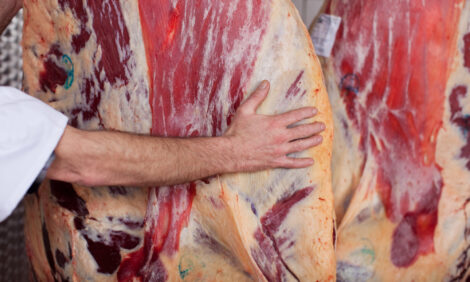



Bayer’s Care4Cattle initiative
Interview with Almut Hoffmann, Head of Global Marketing Farm Animal Products..png)
Visit http://go/bayer.com/Care4Cattle to find out more about the Care4Cattle grant and to apply.
1. In your opinion, what does animal well-being mean and why it is so important for the cattle industry?
To me, ensuring the health and well-being of the animals in our care is the right thing to do. It is an obligation anyone who has taken on the responsibility to keep animals has and should not differ by the species or the number of animals one cares for. Animal well-being is a fundamental driver for productivity of the animals and is becoming more and more a topic of concern for the consumer. Therefore the livestock industry has a tremendous opportunity to advance both the active engagement in animal well-being and the communication about it.
2. How important is innovation in progressing cattle well-being at a farm level?
Innovation means something new and different that benefits or adds value to animals, livestock professionals and farming operations. As to my point above, the value of advanced animal well-being can be demonstrated very clearly. For example, innovation in preventative measures and early diagnostics have played an important role in improving animal well-being along with innovation in animal handling and housing. This will certainly continue and the new digital age offers an even broader set of opportunities.
3. What challenges are facing livestock professionals when it comes to advancing the care and well-being of their animals?
Probably the largest barrier is the required behavioural change with many practices being conducted as they are the known way of doing things. For example, livestock keeps being a very traditional, often family owned business which builds on past experience and inherited knowledge. Change here will come from a fundamental belief that the new way offers benefits to the animals but also to those keeping them.
To some, it may seem logical to minimise production costs in order to maximise profit. However, when it comes to animal husbandry, scientific evidence increasingly demonstrates that any investments towards enhancing animal well-being has positive impact on productivity and quality. And many of these changes aren’t necessarily complicated or costly. In short, what is good for the animals is good for the farm.
This is why we actively engage with livestock professionals around the world to share knowledge expertise and demonstrate good well-being approaches through best practice case studies. Our aim is to support livestock professionals to further enhance conditions on farms for the benefit of the animals.
4. How has dairy and beef cattle well-being changed in the past decade, and what do you think the future holds?
There has been much advancement made in this area. One example in dairy would be the reduction of tie stalls, and for beef, transportation conditions have significantly changed as well. Also, many additional opportunities are available to prevent diseases in the first place, starting from hygiene and vaccination measures to the reduction in densities of animals being kept. However many of these advancements were driven by changes in regulations or market demand.
Positive change has also been brought about by innovative thinking livestock professionals and individuals, who continually seek new or better ways and practices in animal husbandry. From my perspective, there is no end point to advancing animal well-being and this will continue to be in emphasis, especially with the introduction of portable technologies which will enable even better disease surveillance and early diagnosis. I also believe that the voice of the consumer will get louder and that many of the changes ahead of us will be driven by their demands.
5. Why did Bayer decide to launch the Care4Cattle initiative and what do you hope to achieve from it?
Bayer has the fundamental belief that improving lives is never a job finished. It is our responsibility to continuously look for opportunities to further improve the health, and therefore also the well-being, of animals around the globe. We are committed to deliver scientific innovations, as well as new technologies. But also, we want to emphasise the good efforts of livestock professionals who are driving practical well-being advancements on farms because together we can amplify the benefits of good animal well-being to millions of individual animals, people and the communities who depend on them.
6. What does the collaboration with WFO mean for the initiative and why is it important?
Animal well-being is a huge field that is interpreted in many different ways. So it is important for us to have a strong partner that will ensure the perspective of the farmer is kept in mind just as much as the animal’s fundamental needs. Engaging and supporting farmers around the globe, with practical tips and funding through Care4Cattle, is essential and the most impactful way to continuously advance animal well-being. Such a collaboration helps us to build on their knowledge and work hand in hand to get practical solutions.
7. What would Bayer like to see in applications for the grant, are you able to give an example of an innovation a livestock professional has put in place to help with the well-being of their livestock?
With the Care4Cattle initiative we want to find innovative and practical solutions which advance animal well-being. The grant is aimed to support livestock professionals put their ideas into practice – ideas that make a difference to the well-being of cattle.
For us it is important that a project is practically feasible and easy to implement on the farm as we want to follow these projects through implementation. Therefore, applicants need to demonstrate that their project benefits the animals, adds value to the farming operations, is innovative, has an economic viability and is practice-oriented. There are many good examples of how livestock professionals constantly develop new and better ways, especially when it comes to handling of animals.
8. How will the Care4Cattle initiative support the chosen applications?
The Care4Cattle initiative funds the selected cattle well-being projects. With a total of 30.000 Euro we offer targeted support, not only through funding but also by following the projects through to implementation, sharing our knowledge and expertise to help them succeed.
9. How easy is it to apply for the initiative, what does the entry involve?
The idea that stands behind Care4Cattle is – very much like the projects we want to support – to be practical. If you have a good and innovative idea for a project, the only thing you need is to submit a proposal and to tell us why your project would make a difference. The initiative is open for farmers, veterinarians and researchers – people we see as the key to advancing animal well-being, as they have dedicated their lives to animal health and well-being.
In a nutshell, we are looking for livestock professionals around the world who are passionate about advancing cattle well-being and have a concrete idea for new or better ways to further improve on-farm practices.
10. Do you have any advice for livestock professionals looking for ways to advance well-being in their cattle herd and what information is available for them to use on this topic?
There certainly is no “one size fits all” recommendation. Production systems vary across geographies and so do climate and housing conditions. In order to be sustainable, well-being measures also need to be considered alongside productivity and the environment.
Bayer has many examples around the world as to how the different production systems have evolved their way of including animal well-being aspects into their management. We believe that together with the industry, vets and farmers, we can further advance animal well-being around the world, tailored to needs of individual farmers and animals.


